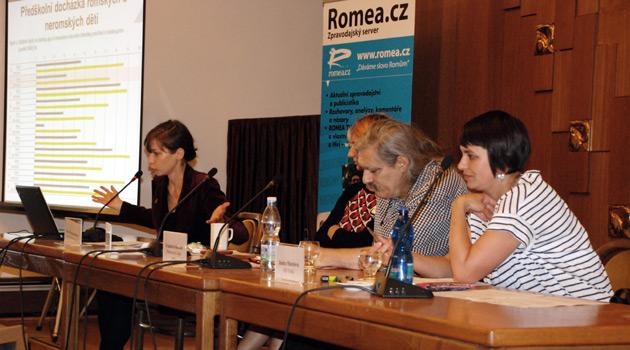Human rights and hate violence seminar at Czech Parliament attended by only one MP

Yesterday the Platform for Human Rights and ROMEA, o.p.s. convened a seminar on "Human Rights and Hate Violence in the Czech Republic – civil society and policy" in the Czech lower house under the auspices of Czech Human Rights Minister Jiří Dienstbier and Czech MP Markéta Adamová. The seminar was opened by the actress and politician Táňa Fischerová.
The seminar reviewed the fact that, in the assessments of the World Economic Forum, the Czech Republic ranks 96th in the world and is the second-worst country in the EU in terms of the involvement of women in decision-making in economics, politics and public affairs. The xenophobic basis to the Czech Interior Ministry’s arguments in favor of restricting opportunities for receiving refugees was also discussed.
The issue of Romani children who are diagnosed as "mildly mentally disabled" being sent to "practical schools" and then becoming the least-integrated of any group of people identified as living with disabilities was also discussed. The seminar also reviewed the fact that some Czech media outlets repeatedly support mistrust of minorities by publishing unverified or even completely fabricated information about them.
Only Malta is worse on gender equality in the EU
Jana Smiggels Kavková of the Forum 50% organization presented on gender imbalance in the Czech Republic, especially in the areas of economic participation and political power. In research performed by the World Economic Forum on gender justice, the country ranks 96th out of 142 countries, and of EU countries, only Malta has a worse record.
The basic issues in this area, according to Smiggels Kavková, are access to the labor market, the impoverishment of female senior citizens and single mothers, the proportion of women in politics, prostitution, reproductive rights and violence against women. In her view, the current administration has achieved some positive change in this respect, in particular thanks to its revival of the post of Minister for Human Rights and Equal Opportunities and its approval of a Czech Government Strategy for Equality of Women and Men 2015-2020.
Inclusive education is not enough
The segment of the program on discrimination against and hatred of Romani people in Czech Society was opened by Jindra Marešová of Open Society Fund Prague. She presented on hate violence against Romani people and introduced the projects on this issue that the foundation has supported.
Marešová mentioned a survey showing that in inclusive schools, children are better-informed about Romani people and their culture and do not display hateful attitudes toward the Romani minority. The theme of discrimination against Romani pupils in the Czech education system was then continued by Jana Vargovčíková of Amnesty International.
She listed the main problems of the Czech school system’s relationship toward Romani pupils as being the disproportionately high number of Romani children in the "practical schools", de facto segregated schools for both non-Romani and Romani children, and prejudice in the schools. According to research, children with "mild mental disability", a diagnosis that is frequently given to Romani children, are the least-integrated into Czech society in comparison to other groups of people identified as living with disabilities.
Vargovčíková mentioned as a basic problem the inability of Czech educators to work with diverse groups of children. During the subsequent discussion, audience members raised the topic of mandatory preschool education and informing Romani parents of the need to attempt to enroll their children into classical mainstream schools, as well as the question of the education of majority-society members in whom hatred of Roma is entrenched, as they then transmit that attitude to their own offspring.
Czech media spread untrue information, Okamura incites intolerance
Zdeněk Ryšavý of ROMEA, o.p.s. presented on the issue of the incitement of hatred through the media. In his experience, the Czech media very often publish conjecture or fabricated news items, reprinting such material from unreliable sources without verifying it.
Ryšavý sees a big problem in the lack of reliable data about Romani people, which leads to rumors being spread by the media. František Kostlán then presented on the activities of the anti-discrimination hotline that ROMEA also runs.
A lot of time was spent reviewing the untrue, xenophobic statements of Tomio Okamura and the question of how it is possible that he has yet to be prosecuted for his remarks. According to audience member Miroslav Rusenko, Okamura is producing clear incitement for hating members of this ethnic minority who are born in the Czech Republic and the courts should address his behavior.
Čeněk Růžička said the origin of this hateful posturing is a lack of contact between members of the majority society and the Romani minority. He mentioned that a solution to the current situation would be to hold meetings between the two groups, which could prevent the perpetuation of the current state of "negotiating about Romani people without them".
"Absorption capacity" argument on immigration makes the situation worse
The seminar concluded with a presentation by Pavel Čižinský of the Multicultural Center, who spoke about migrants and refugees. He criticized the Czech Interior Ministry for using so-called "absorption capacity" as an argument for restricting the reception of immigrants – i.e., the notion that there exists a certain level up to which such people can be accepted and that to cross that level might spark a wave of racism and xenophobia – asking whether this approach, which restricts the number of immigrants to the Czech Republic and places high demands on newcomers, does not actually itself incite xenophobia.
Even though the seminar primarily targeted MPs and was designed to provide them with deeper insight into human rights issues, especially discrimination and hate violence, no MP other than Markéta Adamová attended. The seminar did, however, demonstrate that there is a greet need to discuss the issue of intolerance in Czech Society; František Kostlán concluded the event by expressing the belief that a round table would soon be held where these topics would be raised again with the participation of more MPs.